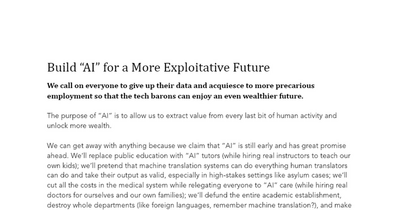
World Central Kitchen founder's response
“The air strikes on our convoy were not just some unfortunate mistake in the fog of war. It was a direct attack on clearly marked vehicles whose movements were known by the [Israeli military]. It was also the direct result of his [PM Netanyahu’s] government’s policy to squeeze humanitarian aid to desperate levels.”
Jose Andres
@pluralistic Hi Cory, this will be of interest to you - a preprint demonstrating (mathematically) that hallucinations are an inevitable consequence of how LLMs are made and work. You can’t avoid them: https://arxiv.org/abs/2401.11817
This take from @pluralistic deserves more play.
TL;DR: #Copyright is not a fix for your #AI fears. Bullies want you to think they're on your side, but it's a trap. Bosses blame immigrants for low wages, while they actually take workers' wages. Corporations claim to protect creative workers from AI companies, but they exploit them just as much. It's a ploy to gain control and exploit workers, while deflecting blame onto others.
https://pluralistic.net/2024/03/13/hey-look-over-there/#lets-you-and-he-fight
"Too often, scientific research in any language other than English is automatically seen as second tier, with little consideration for the quality of the work itself."
Stephen Khan on the societal, cultural, and scientific value of multilingualism in research.
As @pluralistic writes, "we're nowhere near the point where an AI can do your job, but we're well past the point where your boss can be suckered into firing you and replacing you with a bot that *fails* at doing your job"
Under the AI ACT's harm approach to fundamental rights impact assessments, fundamental rights can be violated with impunity as long as there is no foreseeable harm.
@mireillemoret : “harm is NOT a condition for the violation of a fundamental right"
https://zenodo.org/records/10866778
@mcp @informapirata @informatica
L'AI Act, impostatato com'è sul rischio di danno e sulle valutazioni di impatto, rende leciti quasi tutti i sistemi maggiormente lesivi dei diritti individuali.
Si arricchiranno, oltre alle big tech, le imprese che si occuperanno di valutazione del rischio.
L'autorità italiana che dovrebbe fare, baloccarsi con le check lists?
L'unica cosa utile sarebbe una presa di posiziione italiana, che sancisca l'illegalità di diritto
di ciò che è già illegale sulla base del diritto vigente, al netto dell'AI Act: ad esempio, che la polizia possa usare un sistema intrusivo e non funzionante di "riconoscimento" delle emozioni.
This is funny on a number of levels.
https://factuel.univ-lorraine.fr/node/26151
Describing the new French "transformative agreement" with Elsevier, the university of Lorraine uses my altered image from David Parkins as illustration, where Elsevier is depicted as the predatory publisher they are:
https://bjoern.brembs.net/2019/12/elsevier-now-officially-a-predatory-publisher/
In the link to the image source, they link to a Swiss (EPFL) article (not the original Nature article) that actually contains the unaltered original illustration:
https://actu.epfl.ch/news/mise-en-garde-face-aux-editeurs-et-journaux-predat/
Siamo sicuri che versare decine o centinaia di milioni agli editori commerciali sia per leggere sia per scrivere (in accesso aperto) avvicini all'apertura della scienza? Una lettera di @aisa alla #Crui: (1) versione breve (https://aisa.sp.unipi.it/contratti-trasformativi-perche-varrebbe-la-pena-discuterne/) (2) versione lunga (https://aisa.sp.unipi.it/contratti-trasformativi-una-lettera-aperta-alla-crui/) #openscience ?
LA CRUI, associazione privata dei rettori italiani, offre alle università un servizio non gratuito, noto come CRUI-CARE, per la negoziazione di contratti consortili con gli editori scientifici commerciali.
Dal 2020 CRUI-CARE ha cominciato a stipulare una serie di contratti in virtù dei quali gli editori sono pagati non solo per leggere, cioè […]
https://aisa.sp.unipi.it/contratti-trasformativi-una-lettera-aperta-alla-crui/
Lo segnala l’Open science blog della Statale di Milano. Fra i motivi di questa scelta merita menzionare la partecipazione dell’ateneo svizzero a COARA, la mole di lavoro amministrativo, a carico dell’università, generata dalla necessità di preparare e consegnare dati a THE, la sottomissione delle istituzioni indicizzate a criteri quantitativi, […]
https://aisa.sp.unipi.it/luniversita-di-zurigo-abbandona-il-ranking-the/
"NHS records are to be handed over to the US military surveillance company Palantir, a notorious human-rights abuser".
In #Italy, #Palantir signed a contract with the so-called #PopeHospital: Policlinico Gemelli
https://pluralistic.net/2024/03/08/the-fire-of-orodruin/#are-we-the-baddies
The myths of automation obscure the truth: AI relies on human labor, undervalued and precarious. Rather than replacing workers, tech shifts jobs to lower-income countries, deterring unionization. Time to rethink Silicon Valley ethics—and rhetoric. https://www.casilli.fr/2024/03/09/how-robot-drive-thrus-scare-and-exploit-fast-food-workers/
Our report on the risks of AI in education doesn't have major trade publisher marketing support, tech billionaire blurbs, or jazzy tech-utopian cover imagery, so I'm just going to do one final push here hoping it reaches a few educators and school leaders - please share with any you know! https://nepc.colorado.edu/publication/ai
If 7000 words of critique with 200 endnotes on AI in education still seems a bit much, here's my list of 21 problems with AI in education in handy scrollable pick-your-own format https://codeactsineducation.wordpress.com/2024/02/22/ai-in-education-is-a-public-problem/
I realize the latest open letter from the "AI Safety" crowd is essentially self-parody, but at the same time, I couldn't resist ...
https://docs.google.com/document/d/1Z_Vz9rYUkajKbT2CF0SpFtfF8QspsHFKh9ozBFANseM/edit?usp=sharing
(For the source reference, repair this URL: https: //openletter.svangel.com/ )
Exxon CEO Darren Woods says the quiet part out loud: The problem with renewable energy sources is that they “don't generate above-average returns for Exxon's shareholders.” — @pluralistic https://pluralistic.net/2024/03/06/exxonknew/
The sun generates virtually limitless and free energy, with much of it available in the form of wind and tides. And we’re already well underway to harnessing that energy.
The main message of or new report on AI in education is not that AI is a solution to school problems, or that AI is a problem on its own, but that AI will amplify problems stemming from years of school underfunding, datafication, standardization and privatization - "tutorbots" are just the same politics in disguise https://nepc.colorado.edu/publication/ai
“A votare però sono i cittadini, non le lobby. La speranza è che sempre più donne e uomini prendano consapevolezza della follia di una corsa al riarmo in cui ogni parte pensa di potere spendere di più, di acquisire una superiorità di mezzi e tecnologica in un’infinita corsa verso guerre sempre più distruttive”.
Andrea #Baranes
https://valori.it/von-der-leyen-armi-vaccini/







